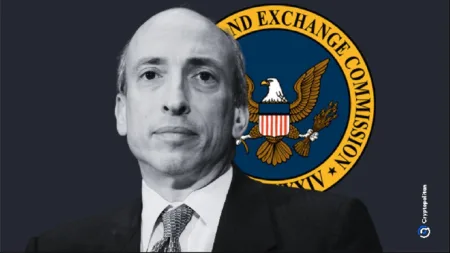Recently, Customers Bank, a financial institution known for its crypto-friendly stance, has agreed to intensify its risk management practices after the U.S. Federal Reserve raised concerns about the bank’s oversight of digital asset clients. The Pennsylvania-based bank, which has served high-profile cryptocurrency firms, has committed to rectifying its compliance shortcomings.
In a recently signed enforcement agreement, top executives of Customers Bank acknowledged the Federal Reserve’s findings of “significant deficiencies” in the bank’s risk management protocols and adherence to anti-money laundering laws. The Fed highlighted that the bank had fallen short in properly monitoring and mitigating illicit activities, particularly among its digital asset clientele.
Customers Bank, a subsidiary of Customers Bancorp (CUBI), has been a vital partner to some of the biggest names in the crypto industry, including Galaxy Digital (GLXY), Coinbase (COIN), and Circle. However, following the collapse of several tech-focused banks serving the crypto sector last year, Customers Bank had already begun to show signs of strain in maintaining its crypto relationships. In June, reports emerged that the bank was reducing its exposure to hedge fund activities and had imposed limits on crypto deposits.
Operating exclusively in U.S. dollars, Customers Bank does not hold cryptocurrencies or extend loans to support crypto activities. Instead, it provides its digital asset clients with a blockchain-based payments platform called Customer Bank Instant Token (CBIT), enabling real-time U.S. dollar transactions around the clock. This service was specifically highlighted in the enforcement order issued by the Federal Reserve.
Under the terms of the order, Customers Bank is required to submit a series of written plans to the Fed, outlining a new compliance strategy. This includes a commitment to ensure the bank gathers, analyzes, and retains accurate information for all its customers. Additionally, the bank must inform the Fed at least 30 days before launching any new strategic initiatives, products, services, or third-party relationships related to its digital asset strategy.
Regulatory Agencies Strengthen Oversight
The enforcement action against Customers Bank aligns with broader efforts by U.S. regulatory agencies, including the Federal Reserve, the Office of the Comptroller of the Currency, and the Federal Deposit Insurance Corp., to limit the banking sector’s exposure to the volatile crypto market. Last year, the Fed announced the creation of its “novel activities supervision program,” which deploys specialized experts to assist regular banking supervisors in monitoring the intersection of cryptocurrency and traditional banking.
Although a spokesperson for Customers Bank was not immediately available for comment, the institution has reportedly started taking steps to address the identified deficiencies. Moving forward, the bank’s ability to comply with the Fed’s directives will be closely watched as it navigates the complex and evolving landscape of digital assets.
More Crypto Friendly Banks Coming on Around
Taiwan’s leading cryptocurrency enterprise, BitoGroup, has formed a strategic partnership with Far Eastern International Bank to roll out bank accounts that seamlessly integrate with cryptocurrency wallets, enhancing transactional efficiency for users. This collaboration is designed to revolutionize how clients interact with their digital assets and traditional banking services.
The partnership is being hailed as a significant step in connecting the worlds of traditional finance (TradFi) and digital currency. According to a statement from the companies, this innovative offering provides users with a robust and reportedly more secure platform for managing both fiat and crypto transactions. This development is the result of extensive research and development, spanning three years, during which both companies worked to synchronize their systems.
The newly launched accounts can be linked directly to a user’s BitoPro exchange account, with setup reportedly taking no more than an hour. Feedback from a pilot program revealed that users saw a 25% uptick in their daily transaction volumes, signaling strong community interest and engagement.
By merging the capabilities of traditional financial systems with those of cryptocurrency exchanges, BitoGroup aspires to build a reliable and secure ecosystem for transactions. This collaboration is anticipated to drive further innovation and increase the flexibility of utilizing both fiat currency and digital assets.
In addition to its partnership with Far Eastern International Bank, BitoGroup has teamed up with Neweb Technologies, Taiwan’s largest third-party payment processor, to introduce “BitoPay.” This solution enables 300,000 merchants and millions of consumers to conduct transactions using cryptocurrency, making it the most widely accepted crypto payment method across Taiwan.
The cryptocurrency sector in Taiwan is gaining momentum with the establishment of the Virtual Asset Service Provider (VASP) Association. BitoGroup’s founder and CEO, Titan Cheng, has been appointed as the inaugural Chairman of this association. This initiative marks a significant collaboration between cryptocurrency platforms and traditional financial institutions, aimed at building trust with regulatory bodies and strengthening the foundational framework of Taiwan’s crypto-financial system.
Last year, Taiwan’s cryptocurrency industry took a proactive step by forming an industry association in conjunction with the nation’s financial regulator. This move was a precursor to the release of official guidelines for the sector. To expedite the regulatory process, nine cryptocurrency companies established a working group, expressing their intention to apply for the formation of an industry association by
Since 2021, Taiwan has enforced stringent anti-money laundering (AML) regulations on VASPs, as dictated by the Financial Supervisory Commission. However, apart from these AML measures, Taiwan’s broader cryptocurrency industry has largely operated without formal oversight. In response, the FSC announced plans last year to issue comprehensive guidelines concerning cryptocurrency trading and payments for VASPs, signaling a shift towards greater regulation and oversight.
Surge in Account Freezes Among Crypto Professionals
Despite the introduction in Taiwan, a recent uptick in the freezing and restriction of bank accounts belonging to crypto professionals has been observed across the UK, US, and EU. This trend has raised alarms within the cryptocurrency community, as even long-standing relationships with banks offer no immunity from sudden account closures.
Revolut, often hailed as the most crypto-friendly bank in the UK, has come under scrutiny after an incident involving the freezing of an account linked to cryptocurrency transactions. Despite its reputation and services like in-app crypto purchases, the bank’s recent actions have led to doubts about its commitment to a seamless experience for crypto users. The situation escalated when a customer attempted to transfer 0.23 ETH (£550) to a personal wallet, only to find the transaction blocked, account frozen, and fees deducted. Although the account was later unfrozen, the wallet address remains blocked, casting a shadow over Revolut’s crypto-friendliness.
The UK’s adherence to the Travel Rule, requiring disclosures of unhosted wallet owners, has complicated crypto transactions. While UK firms are permitted to apply a risk-based approach, Revolut’s stringent measures raise questions about their balance between regulatory compliance and user experience. The lack of transparency in addressing account freezes and wallet blocks has further eroded trust among users.
In the United States, the situation is equally concerning, with traditional banks shutting down accounts of crypto professionals without clear explanations. John Paller, co-founder of ETH Denver, experienced this firsthand when Wells Fargo abruptly closed all his accounts after 26 years of patronage. This trend, dubbed “Operation Choke Point 2.0,” appears to be a coordinated effort against crypto-related businesses, as highlighted by Caitlin Long, Founder and CEO of Custodia Bank.
Read the full article here









